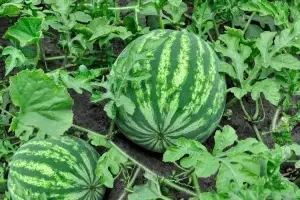🍉 What is Watermelon?
![]()
Watermelon (Citrullus lanatus) is a large, juicy fruit that grows on a vine. It belongs to the gourd family (Cucurbitaceae) and is native to Africa. It has:
-
A thick green rind (sometimes striped)
-
Bright red or pink flesh
-
Black (or white) seeds
-
High water content (over 90% water)
🌱 How is Watermelon Grown?
✅ 1. Climate & Soil Requirements
-
Needs warm temperatures (above 25°C / 77°F)
-
Grows best in sandy loam soil with good drainage
-
Requires full sun and a long growing season (70–100 days)
✅ 2. Planting
-
Planted from seeds or transplants
-
Sown directly into soil after the last frost
-
Spacing: around 3–5 feet apart (vines spread wide)
✅ 3. Care
-
Needs regular watering, especially during fruit development
-
Requires fertilizer (rich in nitrogen early, then phosphorus and potassium)
-
Must be weeded and protected from pests like aphids, beetles, or fungi
✅ 4. Harvesting
-
Ready when the tendril near the fruit dries, or the underside turns yellow
-
Harvested with knives or clippers to avoid vine damage
💰 Benefits to the Grower (Individual & Society)
🎯 For the Individual Farmer:
-
Income Generation: Watermelon sells well in markets, especially during hot seasons
-
Quick Return: It’s a short-term crop with high demand
-
Intercropping Opportunity: Can be grown with other crops early in the season
🌍 For Society:
-
Food Security: Adds to the supply of nutritious, water-rich fruit
-
Job Creation: Supports farming, transport, market vendors, and processing industries
-
Export Potential: Some countries earn foreign income through watermelon export
-
Supports Agribusiness: Triggers demand for seeds, tools, fertilizers, and irrigation
🧠 Health Benefits of Watermelon
💧 1. Hydration
-
Over 90% water – helps keep the body hydrated, especially in hot weather
❤️ 2. Heart Health
-
Contains lycopene – an antioxidant that supports heart health and may reduce blood pressure
🔥 3. Anti-Inflammatory
-
Rich in vitamin C and antioxidants that reduce inflammation
💪 4. Muscle Recovery
-
Contains citrulline, which helps reduce muscle soreness and improve exercise performance
👀 5. Eye Health
-
Provides vitamin A and beta-carotene – important for healthy vision
🍽️ 6. Digestion
-
Contains fiber that helps regulate bowel movement
💊 7. Boosts Immunity
-
With vitamin C and B6, it supports immune system function
📌 Summary Table
| Category | Benefits |
|---|---|
| Grower (Individual) | Income, fast-growing, marketable crop |
| Society | Jobs, food security, economy |
| Health | Hydration, heart, eyes, digestion, immunity |
Conclusion
Thank you for reading this article. kindly let me know your views on the below comment section. Your views shall be used to improve the website performance.





